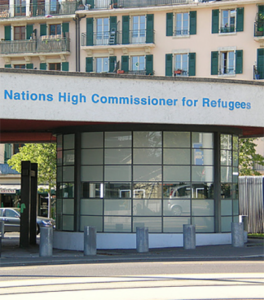Corruption allegations made against UNHCR
The UN’s refugee agency UNHCR has been accused of systemic corruption in a series of articles published by America’s N BC network.
BC network.
The NBC articles allege UNHCR officials had taken bribes to prioritise refugees for resettlement.
They allege a seven-month investigation across five countries with significant refugee populations has found widespread reports of the UNHCR’s staff members exploiting refugees.
The articles also allege victims and staff members who report wrongdoing say the agency fails to act against corruption, leaving them vulnerable to intimidation and retaliation.
“In interviews, more than 50 refugees registered with the UNHCR in Kenya, Uganda, Yemen, Ethiopia and Libya have described corruption and exploitation involving the agency’s staff and personnel from other aid agencies, following similar claims by refugees in Sudan last year,” the reports say.
They cite refugees who are part of the Nakivale settlement in southwest Uganda saying that UNHCR staffers and officials from organisations that work with them demand bribes for everything from medical referrals to food rations to contacting police, and bribes to resettle a family can cost $US5,000.
The reports allege that in the Dadaab refugee camp, in Kenya, whose residents are almost all Somalis, 19 refugees reported that it used to cost as much as $US50,000 to resettle a large family, or roughly $US3,000 per person, before the Trump administration effectively stopped resettlement of Somalis in the US.
And they allege that refugees who cannot afford to pay bribes report that unscrupulous resettlement workers will sell their case files, often compiled painstakingly over years, to others with more wealth.
The UNHCR has rejected the allegations saying they risk jeopardizing the future of refugees in dire need of resettlement.
“UNHCR is one of the biggest and most operational UN agencies, working in 138 countries and serving 68.5 million people. The overwhelmingly majority of our 16,000 personnel are deeply committed professionals, many of whom are working in difficult environments, sometimes risking their own safety,” a statement from UNHCR said.
“As with other organisations, we are not immune to risk or failure on the part of individuals. This is why we have a solid safeguarding structure, which has been further strengthened in the last two years, and which we continuously seek to improve,” it said.
“We are fully committed to ensuring the integrity of our programs. Our workforce is also systematically reminded of the obligation to abide by the highest standards of conduct and to make sure that all their actions are free of any consideration of personal gain.
“Every report or allegation of fraud, corruption or retaliation against refugees by UNHCR personnel or those working for our partners, is thoroughly assessed and, if substantiated, results in disciplinary sanctions, including summary dismissal from the organization.
“Investigations at UNHCR on possible misconduct by our workforce are carried out by the Inspector General’s Office (IGO), which is an independent oversight body. It consists of expert investigators, with a strong background in law enforcement, military, war crimes tribunals or people who occupied similar functions in private companies and other international organizations.
“In recent years, additional investigators were recruited and some stationed in Nairobi, Pretoria and Bangkok enabling them to deploy rapidly and to have a better understanding of local contexts and issues.
“UNHCR disciplinary measures have been reinforced, with a 60 per cent rise in the number of disciplinary actions taken by the High Commissioner between 2017 and 2018. Referrals to national authorities are undertaken systematically in cases involving conduct that may amount to criminal conduct and waivers of immunity facilitated,” the statement said.
UNHCR has also launched a confidential independent helpline available to staff who wish to report misconduct or obtain advice on what to do when in doubt.
“We are committed to eradicating misconduct from our organization. If we receive pertinent information concerning alleged fraud, corruption or misconduct by a member of our workforce, we take action, and if the allegations are substantiated, act to end such inappropriate and unacceptable behaviour,” the statement said.
“UNHCR encourages anyone, including refugees and journalists, with information about suspected fraud or other wrongdoing to contact its Inspector General’s Office without delay at http://www.unhcr.org/inspector-generals-office.html.” it said.
Laurie Nowell
AMES Australia Senior Journalist












